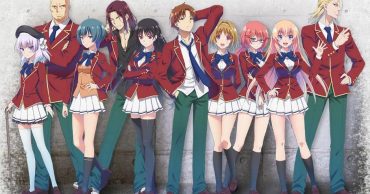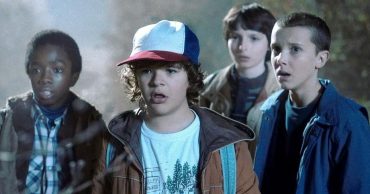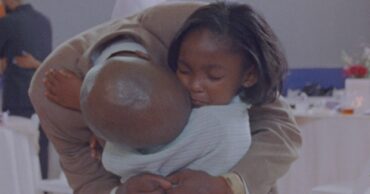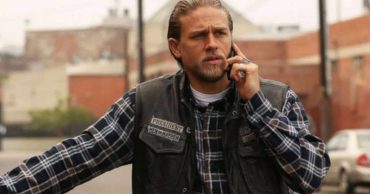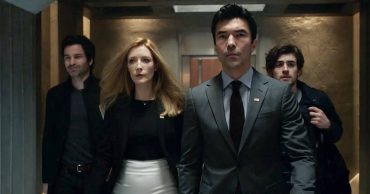Truxton Spangler is one of the most enigmatic characters on television. The head of national think tank API, the character is one of Rubicon — and television’s — most morally gray villains. He’s portrayed expertly by Michael Cristofer, a star in his own right: Cristofer is a Pulitzer Prize winner for his play, The Shadow Box, which also won a Tony award. The man’s unique portrayal of the character has led to almost universal critical acclaim; there’s already Emmy buzz building for both him and his co-star Arliss Howard. I was recently able to speak with Cristofer about his role on the series, which airs its season finale, “You Never Can Win,” on Sunday night.
Truxton has been at least partially responsible for a great number of deaths due to the terrorist attacks that he’s orchestrated. Despite this, he’s such a likable character. How do you view him? Are there any good qualities in him?
I think there are a lot of good qualities in him. I think that he, to my mind, is a very contemporary version of a tragic figure. I truly believe that he thinks everything he does, he’s doing for the good of the country. These seven guys [from Fisher Island] were these conspirators, they’re manipulating the information from API so for their own profits, for their own wealth. But I truly believe that for Truxton, I think he believes that all the events he’s been manipulating, he’s been doing that for the good of the country. I think that’s a sort of tragic flaw because he is doing basically very evil things. But I do believe that’s what he thinks and that’s my view of that character. In the [final scene of “Wayward Sons”] of the oil tankers blowing up in the harbor, part of this sort of organized terrorist attack, part of it has to do in Truxton’s mind with getting America off oil. So behind all these terrible things that he’s doing, he believes that one of the things he’s doing is getting the United States off its dependence on oil ,which he believes the government will never be able to accomplish, therefore, it has to be accomplished to nefarious means. That’s the kind of reasoning I think is going on in Truxton and it’s why he really does care about API, he really does care about the people who work there, he really does think that they are doing something that will benefit the country. And at the same time, he totally believes that certain things, morally questionable things need to be done to accomplish those ends.
You’re a Pulitzer Prize winner for your play, The Shadow Box. Do you have any creative input on the series? Do they come and ask you, “What do you think we should do at this point?”, or do you just go by the scripts?
Well, they didn’t come running to me and ask me (laughs). But when Henry [Bromell] took over the show [from creator Jason Horwitch], it was kind of late in the game. When we started shooting, we certainly knew who all the characters were, but there was only one or two scripts that were written at that point. So scripts would be written as we were shooting and we would get a script four or five days before we started shooting that. That was when the script was finished, so many of the characters were being developed as we were shooting the series. So, in that sense, I certainly did open my mouth a lot because I really felt strongly about Truxton and what was going on with him, and I loved playing him so much. So I was giving them probably more input than they wanted to hear, but they were very nice about listening (laughs). And some of it did affect what was being written. But technically, I was not really involved. I was only involved as an actor, asking and trying to shape things for my character.
One of the great things you did bring to the character is that wonderful syntax that Truxton speaks with. He has a way of speaking that can add to a scene’s tension simply with delivery. Where did that way of speaking come from?
Henry based the character on a real person. When Henry was very young, he worked at the New Yorker magazine. The man who was running the magazine was William Shawn, who was very, very famous in New York literary circles. He was also a very eccentric guy who did eat cornflakes everyday for lunch in the connoisseur at the New Yorker. Many other things were in the character from that guy. I also knew a very, very, very famous agent in New York who was with ICM for years, and represented almost everybody who was important back in the 70’s and 80’s, and that was a man named Sam Cohn. I didn’t know William Shawn, I read about him and learned about him from Henry. But Sam Cohn had a very peculiar way of speaking. He was this very powerful man, but he always seemed slightly distracted. And he was very cheerful when doing some really nefarious things. So a lot of, I think, what I was doing with the character came from my memory of Sam Cohn.
Your scenes with Arliss Howard and James Badge Dale really sizzled on the screen. Does it get as intense on set as it does between your characters? Those must be really high pressure scenes.
Well, we got to work together for three or four months. You do have a relationship, and you do have a kind of sense of trust building up especially with Badge and especially with Arliss, because I have more scenes with those two than anybody else, really. And they’re both really experienced and wonderful actors. And we all come out of New York, because somewhere we’ve worked with each other or know each other. But I would say we always knew when we were coming up to one of those more intense scenes. And fortunately, we had time on the set to rehearse. Most of the directors gave us a time to rehearse. And so, I guess because we had the trust, and because the writing was so good, I think the environment could get as intense at it needed to get within the scene and with each other. We felt safe enough to go as far as we needed to go and I think that’s why some of the scenes turned out so well.
 So what can we expect from the season finale on Sunday?
So what can we expect from the season finale on Sunday?
I think you can expect that some people are not going to make it out alive. And I think you could expect that there will be a final confrontation between [Will] and Truxton.
Speaking of final confrontations, the show’s future is still uncertain. Nobody knows whether or not it’s coming back.
And we don’t know either. Nobody I know seems to know yet either, so we all sort of have our fingers crossed.
Did the show leave off at a place where a second season is a definite possibility?
Definitely. I can’t say why, but yeah. There’s definitely room for this story to continue. Henry said that he was really pleased with some of the episodes that seemed to be more self contained. So, there might be more episodes [next year] that are more self-contained and not as much a sort of ongoing fourteen-episode story. So there’s possibility of both things happening at once. In other words, there would be an overall happening that carries over the thirteen episodes, but within individual episodes, there might be stories that actually resolve themselves along the way.
One final question: I wrote an open letter to AMC earlier this month, just asking them to renew Rubicon for a variety of reasons. What would you say is the number one reason for the show to be renewed?
I would say the number one reason for Rubicon to be renewed is because I would like to spend another year with Truxton Spangler.
I think we all would.
I know! I mean, it’s just such wonderful writing and I guess I’d like to spend another year with the rest of these characters too. It’s just great, isn’t it? And thank you so much for supporting it.
 Follow Us
Follow Us
